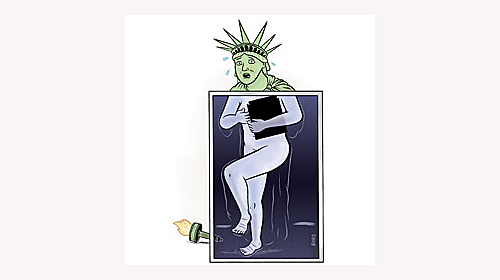
On Monday the House Oversight and Government Reform Committee held challenging the flurry of pricey and privacy-invading tactics that the Transportation Security Administration has employed since September 11. The "Effective Security or Security Theater" hearing examined whether these measures have been truly effective at preventing terrorism, or if they have just been effective at creating an illusion of safety.
It's important to note at the outset that TSA has admitted that, despite its best efforts, it cannot ensure that Americans will ever be 100 percent . So the question is: what we can do that is effective and privacy protective? The members went after many of TSA's past and current programs that ÔÇö despite their incredible cost ÔÇö have ultimately proven ineffective.
Members discussed the uproar from the launch of the Whole Body Imaging (a.k.a. naked) machines that flooded airports without proof that they would . Rep. Darrell Issa (R-Calif.) told stories of constituents who had medical conditions prohibiting them from being exposed to the radiation of the naked machines, but were so uncomfortable with the alternative ÔÇö aggressive pat-downs ÔÇö that they were ultimately unable to travel. (Follow this link to read more stories compiled by the └¤░─├┼┐¬Ż▒Żß╣ű.)
Members then challenged TSA's newest controversial tactics.
TSA has recently been touting the Screening of Passengers by Observation Techniques , which deploys behavior detection officers to watch for suspicious behavior among air travelers. Targeting individuals for "suspicious" behavior is a slippery slope, and one which has already resulted in Americans being targeted for their race or .
Although he failed to address these civil liberties concerns, Issa did point out that the SPOT program simply doesn't work. It has not resulted in the arrest of a single terrorist since its launch in 2003, and Government Accountability Office reports raise serious questions about whether the program ever will ever be . Stephen Lord, Director or the Homeland Security Program at GAO, testified that validation of the program could take several more years and that TSA had jumped the gun on implementing it.
Rep. Marsha Blackburn (R-Tenn.) questioned the use of the new roving security checkpoints known as the Visible Intermodal Prevention and Response program that has expanded TSA searches to highway rest stops, train terminals, and bus stops. She wondered if the agents had received proper training to perform the kind of invasive searches they are conducting around the country. You can add that to the └¤░─├┼┐¬Ż▒Żß╣ű's wide-ranging concerns over the way VIPR erodes the Fourth Amendment.
Rep. Blake Farenthold (R-TX) asked the agency to "use common sense and slow down" in their implementation of security tactics. We agree. We encourage TSA to complete the transition toward the less invasive silhouette outline body scanner images and eliminate the SPOT and VIPR programs. We also call on TSA to scale back aggressive pat-downs that treat Americans like criminals and humiliate many innocent travelers.
Transportation security is a challenging issue, but there are commonsense safeguards that we can put in place to provide security for Americans while protecting their right to privacy. When we stray from those goals we end up where we are today: with a litany of programs that don't do much except violate our privacy.
Visit our "Know Your Rights When Traveling" page here, and if you feel your rights have been violated while traveling, be sure to let us know .
Learn more about airport security: Sign up for breaking news alerts, , and .

